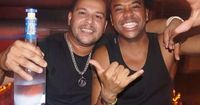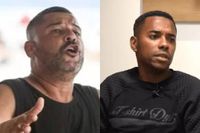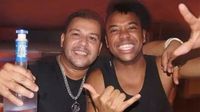Rudney Gomes, a pivotal figure in the high-profile legal saga involving former soccer star Robinho, was found dead in Santos, São Paulo, on the evening of March 18, 2025. The 46-year-old, who was implicated in the collective rape case that once haunted his friend, apparently took his own life, a tragedy that underscores the lingering shadows of their past.
According to the Civil Police, Gomes's body was discovered in a building on Avenida Ana Costa, where he reportedly jumped from the 11th floor. Although emergency services were alarmed to the scene, they confirmed his death shortly after arrival, officially registering it as a suicide.
Gomes's associations run deep in a story tarnished by allegations of sexual violence. He was cited in the severe criminal case against Robinho, who, along with Ricardo Rocha Falco, was convicted of raping an intoxicated Albanian woman in a Milan nightclub back in 2013. The incident occurred during Gomes's birthday celebration at Sio Café, a moment that would lead to severe repercussions for all involved.
Despite being charged, Gomes avoided conviction since he had left Italy before being summoned for the preliminary hearing in March 2016. This led to the judge separating the cases that resulted in Robinho's eventual sentence of nine years in prison—a decision upheld by the Italian courts in 2022.
Witness statements drew attention to Gomes's actions during the crime, with accusations suggesting that he and several others not only watched but also participated in the horrific acts committed against the victim. While Robinho and Falco are currently serving their sentences, Gomes had largely remained out of the public eye since the trial's conclusion.
The Mobile Emergency Care Service (Samu) collaborated with local authorities in the investigation following the discovery of Gomes's body, ultimately confirming his tragic demise on the scene. The sensitive nature of his death has reignited discussions surrounding mental health—a topic that increasingly necessitates open dialogue. The Centro de Valorização da Vida (CVV) offers free emotional support and suicide prevention services, emphasizing the need for accessible resources.
Interestingly, during his stint in professional athletics, Robinho was enjoying a successful career prior to these events, garnering accolades as a prominent player for Milan. However, the dark turn of his life occurred when the infamous case came to light, leading to his eventual detection and arrest by Brazilian Federal Police in 2024, following the enforcement of an Italian court ruling to serve his sentence in Brazil.
Currently, Robinho navigates a harsh reality within the confines of Penitenciária 2 de Tremembé, where he has spent roughly a year since his incarceration. His days consist of structured routines that include classes and the chance to participate in various activities amid an environment that often refers to itself as the "presídio dos famosos," a term derived from the high-profile cases that have graced its halls.
As Robinho's former teammate Ricardo Falco starts his own nine-year sentence in Guarulhos, Gomes’s death offers a haunting reminder of the broader implications surrounding their past actions. The sheer fallout from the trauma inflicted upon the victim—who, at 22 years old, was devastated by the encounter—has raised alarm bells within communities that advocate against sexual violence.
As quoted from police reports, ''The case was registered as suicide'' highlights the gravity of Gomes's mental state prior to his death, suggesting that the psychological burdens stemming from the case may have taken an insurmountable toll.
The entire episode, from the original crime to Gomes's tragic death, poses more than legal repercussions; it unearths societal dilemmas surrounding sexual violence, responsibility, and mental health awareness. As investigations continue and conversations deepen regarding preventive measures, the story of Rudney Gomes stands not only as a grave reminder of past misdeeds but as a call to action for greater mental health awareness and support, echoing Serene voices for change.
In a world increasingly aware of mental health's critical importance, the tragedy surrounding Gomes implores society to forge stronger bonds of support for individuals struggling in silence. While exploring the depths of their heinous acts from years previous, the aftermath of these events lays bare a much-needed dialogue regarding both criminal justice reparation and mental health assistance as fundamental rights within the broader spectrum of societal responsibility.










